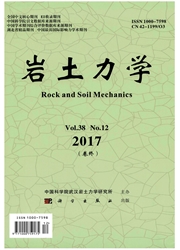

 中文摘要:
中文摘要:
膨润土缓冲材料热传导特性的研究,对于高放废物深地质处置系统的安全评价至关重要。基于串、并联原理,通过将土体孔隙划分为与固相基质并联和串联两部分,提出了考虑矿物成分、颗粒亲水性、孔隙率及饱和度等因素的非饱和膨润土有效热传导系数的4种预测形式,建立了基于4种形式线性组合的有效热传导特性预测模型。详细讨论了模型参数的确定方法,并讨论了孔隙率、饱和度和孔隙结构、颗粒亲水性等因素对土体有效热传导特性的影响。基于MX-80膨润土和高庙子膨润土热传导特性试验成果,对模型的预测性能进行了验证。结果表明,由于膨润土颗粒尺寸较小且具有亲水特性,孔隙内的空气与水宜采用并联描述。研究成果对于非饱和膨润土的导热性能以及工程屏障系统的THM耦合数值模拟研究具有一定的参考价值。
 英文摘要:
英文摘要:
Bentonites have been widely adopted as the bufferlbackfill materials for repositories of high-level radioactive waste disposal. Characterization of the effective thermal conductivity of the buffer materials is of great importance for optimization design and safety assessments of the repositories. Using the concept of the series-parallel structural models, the porosity of soils is decomposed into two components: one in parallel and the other in series connected to the solid phase. An effective structure depends on the decomposition is introduced to describe the heat transfer process of the porous soils considering the structural connections of pores and the solid phase. On this basis, four formulas which represent different series-parallel arrangements of pore fluids (water and air mixture) are proposed to predict thermal conductivity of unsaturated soils with a comprehensive consideration of the effects of mineralogical composition, porosity and saturation. An effective model for thermal conductivity of unsaturated soil is then developed based on a linear composition of the four formulas. Parameterization of the model is discussed; and the behaviors of the model with respect to the variations in porosity and saturation are illustrated. The model is validated against experimental data of thermal conductivity of MX-80 and Gaomiaozi bentonites. The results show that the arrangement of air and water in the pores tended to be in parallel connection for unsaturated bentonites because of the fine size and wettability of the soil particles. This research may provide a helpful reference for predicting thermal conductivity of unsaturated bentonites and numerical modeling of the coupled thermo-hydro-mechanical (THM) processes in the engineered barrier systems.
 同期刊论文项目
同期刊论文项目
 同项目期刊论文
同项目期刊论文
 Modeling coupled processes of non-steady seepage flow and non-linear deformation for a concrete-face
Modeling coupled processes of non-steady seepage flow and non-linear deformation for a concrete-face A water retention curve and unsaturated hydraulic conductivity model for deformable soils: considera
A water retention curve and unsaturated hydraulic conductivity model for deformable soils: considera Effect of seepage control on stability of a tailings dam during its staged construction with a stepw
Effect of seepage control on stability of a tailings dam during its staged construction with a stepw Performance assessment and optimization of seepage control system: a numerical case study for Kala u
Performance assessment and optimization of seepage control system: a numerical case study for Kala u Micromechanical analysis of anisotropic damage and its influence on effective thermal conductivity i
Micromechanical analysis of anisotropic damage and its influence on effective thermal conductivity i A generalized multi-field coupling approach and its application to stability and deformation control
A generalized multi-field coupling approach and its application to stability and deformation control Numerical modeling of soil-pile interface behaviors of a pipe group foundation under complicated loa
Numerical modeling of soil-pile interface behaviors of a pipe group foundation under complicated loa Modeling of coupled deformation, water flow and gas transport in soil slopes subjected to rain infil
Modeling of coupled deformation, water flow and gas transport in soil slopes subjected to rain infil An effective thermal conductivity model for unsaturated compacted bentonites with consideration of b
An effective thermal conductivity model for unsaturated compacted bentonites with consideration of b Excavation-induced relaxation effects and hydraulic conductivity variations in the surrounding rocks
Excavation-induced relaxation effects and hydraulic conductivity variations in the surrounding rocks A homogenization-based model for the effective thermal conductivity of bentonite-sand based buffer m
A homogenization-based model for the effective thermal conductivity of bentonite-sand based buffer m Nonlinear flow behaviors at low Reynolds number through rough-walled fractures subjected to normal c
Nonlinear flow behaviors at low Reynolds number through rough-walled fractures subjected to normal c Evaluation of Forchheimer equation coefficients for non-Darcy flow in deformable rough-walled fractu
Evaluation of Forchheimer equation coefficients for non-Darcy flow in deformable rough-walled fractu Coupled hydro-mechanical analysis of a dam foundation with thick fluvial deposits: A case study of t
Coupled hydro-mechanical analysis of a dam foundation with thick fluvial deposits: A case study of t A coupled stress-strain and hydraulic hysteresis model for unsaturated soils: Thermodynamic analysis
A coupled stress-strain and hydraulic hysteresis model for unsaturated soils: Thermodynamic analysis Estimating effective thermal conductivity of unsaturated bentonites with consideration of coupled th
Estimating effective thermal conductivity of unsaturated bentonites with consideration of coupled th Estimating hydraulic conductivity of fractured rocks from high pressure packer tests with an Izbash’
Estimating hydraulic conductivity of fractured rocks from high pressure packer tests with an Izbash’ Inverse modeling of leakage through a rock-fill dam foundation during its construction stage using t
Inverse modeling of leakage through a rock-fill dam foundation during its construction stage using t Non-Darcy’s law-based analytical models for data interpretation of high-pressure packer tests in fra
Non-Darcy’s law-based analytical models for data interpretation of high-pressure packer tests in fra A relative permeability model for deformable soils and its impact on coupled unsaturated flow and el
A relative permeability model for deformable soils and its impact on coupled unsaturated flow and el Evaluation of groundwater leakage into a drainage tunnel in Jinping-I arch dam foundation in Southwe
Evaluation of groundwater leakage into a drainage tunnel in Jinping-I arch dam foundation in Southwe 期刊信息
期刊信息
